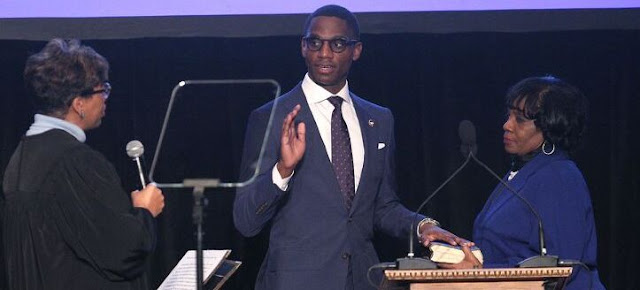CLEVELAND, Ohio- Newcomer Justin Bibb, a former Barack Obama intern and progressive who won the Cleveland nonpartisan runoff election for mayor in November over former Cleveland City Council President Kevin Kelley to become the city's fourth Black mayor and its second youngest behind former mayor Dennis Kucinich, took a ceremonial oath of office Saturday afternoon during an invited-guests-only inauguration ceremony at the Public Hall Auditorium. The event included top police brass and 11th Congressional District Congresswoman Shontel Brown.
Though he was officially sworn-in on Jan 3, and with no audience or hoopla, Bibb, 34, decided to hold Saturdays' ceremonial swearing in before an audience of about 70 people, and a wealth of media anxious to get a story as the pandemic roars on and residents of Cleveland and Ohio, which ranks seventh among the states in COVID-19 cases, remain disproportionately at risk for both the Delta Variant and the Omicon Variant. Flanked by his mother, Charlene Nichols, he was sworn in Saturday by Democratic Ohio Supreme Court Justice Melody Stewart, a former 8th District court of Appeals judge and the first Black elected to Ohio's highest court. He becomes the 58th mayor of the largely Black major American city of some 372,000 people, and succeeds four-term former mayor Frank Jackson, 75 and Cleveland's longest serving mayor.
During his inaugural address on Saturday Bibb complimented Jackson, a city-council president- turner mayor and the city's third Black mayor, for his many years of service to the city, and he said that he walks in his footsteps, along with those of former mayor Michael R. White, the city's second Black mayor, and Carl B Stokes, Cleveland's first Black mayor, and the first Black mayor of a major American city.
The new mayor laid out several initiatives he plans to address, including safety, economic growth, and education.
“We can achieve a safer, more equitable, healthier Cleveland,” the mayor said. “We can be the Cleveland that young people move back to because there are good jobs, safe streets, good schools, quality grocery stores, good healthcare. We don’t just have to dream about Cleveland, we can and will work toward that goal every minute of every single day.”
Congresswoman Brown, a Democrat who was elected in November to replace U.S. Housing and Urban Development Secretary Marcia Fudge, who vacated the post in March to join the administration of President Joe Biden, spoke before Bibb took to the podium and said that Bibb will put Cleveland first, and that he has what it takes to lead the city.
"I know Mayor Bibb's heart is with the people of our city and I know that he will do whatever it takes to char the course for a better tomorrow," said Brown.
The city's 58th mayor, Bibb will govern the impoverished city with help from new city council president Blaine Griffin, who is also Black, and a 17 member city council, the mayor, the council president and all 17 members of city council of whom are Democrats in a city that is a Democratic stronghold. Griffin, a Jackson ally and former community relations board director for the city who did not support Bibb for mayor, was conspicuously absent from the swearing in.
In spite of never holding office before, Bibb was the top vote-getter in a seven-way primary who ran on the political platform of decreasing crime and reforming the city's troubled police department. Armed with endorsements from key people like former mayors Michael R. White and Jane Campbell, U.S. Sen. Sherrod Brown of Cleveland, and the Cleveland Plain Dealer, he went on to win the Cleveland nonpartisan election over then council president Kevin Kelley, a White west side councilman who placed second in the primary. It was an upset of large magnitudes, and a mandate by voters, Black voters in particular.
With the wisdom of campaign manager Ryan Puente, the former executive director of the Cuyahoga County Democratic party who is now the mayor's chief of governmental affairs, Bibb won the November general election with a whopping 63 percent of the vote compared to Kelley's 37 percent, even though Kelley had been endorsed by Jackson and a handful of other city council persons, including Black councilpersons Blaine Griffin, Kevin Bishop and Kevin Conwell.
Now a full time attorney, Kelley opted to run unsuccessfully for mayor rather than reelection to city council where he has served for 16 years representing Ward13, the last eight of those years as council president.
Bibb is also poised to revamp the city's largely Black Cleveland Metropolitan School District, which the city mayor has controlled since 1998 per a state law that eliminated an elected school board and replaced it with appointees of the mayor, a new state law pushed by then mayor Michael White and two Republicans who sponsored the legislation.
The son of a social worker and Cleveland cop who grew up in Cleveland's Mt Pleasant neighborhood, Mayor Bibb is a former banker who holds a law degree from Case Western Reserve University. He interned for Barack Obama when Obama, who later became president, was a junior U.S. senator.
Bibb ran a cleverly crafted grassroots campaign with the support of young progressives across racial lines who embraced his ideas and political stances. He knocked on doors and met with small community groups across the city long before the primary election got underway, and it paid off in the end when he won the crowded primary over six other candidates, all of them Democrats.
Cleveland sits in heavily Democratic Cuyahoga County, the second largest of Ohio's 88 counties, and most of its residents live in poverty. It is the most segregated city in the nation behind Boston and most Blacks reside on the city's east side and Whites on the west side, the two sides separated by the Cuyahoga River.
| < Prev | Next > |
|---|









